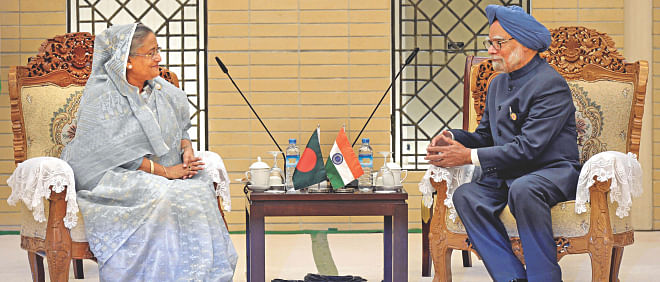More Indian power
More Indian power
Manmohan pledges 100MW electricity; tells Hasnia Teesta deal 'difficult one'

India has assured of providing 100 more megawatts of electricity to Bangladesh from Tripura's Paltana power plant to meet the growing demand.
At present the neighbour country supplies 500 MW of electricity to the national grid through the South-western region.
Indian Prime Minister Manmohan Singh made the pledge to his Bangladesh counterpart Sheikh Hasina during a 25-minute meeting on the sidelines of Bimstec summit in Nay Pyi Taw, Myanmar yesterday.
Briefing reporters, prime minister's special aide Mahbubul Hoque Shakil said the two prime ministers had discussed issues of bilateral interests, including cooperation in the areas of power sector, trade, investment and implementation of the agreed decisions.
Diplomatic sources said the India had pledged the additional electricity, as Bangladesh had allowed it to transport Over Dimensional Cargo (ODC) and equipment for the 700 MW Paltana power plant through its roads and waterways for free of cost.
Of the current 500 MW of electricity from India, Bangladesh is buying 250 MW from an Indian state-owned company and another 250 MW from a private company under a deal signed in 2010.
Bangladesh will also buy the additional 100 MW of electricity.
Meanwhile, Hasina yesterday had meetings with the President of Sri Lanka and Prime Minister of Nepal on the sidelines of the Bimstec summit.
Our New Delhi Correspondent Pallab Bhattacharya reports, the Bangladesh PM raised the issue of the long delay in signing the agreement on Teesta river water sharing with Manmohan Singh.
The Indian PM acknowledged that it was a "difficult" issue and said efforts to forge consensus on it were still underway in India.
The agreement on Teesta river treaty was put on hold in September, 2011, after West Bengal Chief Minister Mamata Banerjee had expressed reservations over the quantum of water to be given to Bangladesh and she had opted out of Singh's entourage to Dhaka.
"The Bangladesh Prime Minister did raise the issue of Teesta. Our prime minister said: 'It is a difficult one, but we are trying to resolve it'," Indian foreign office spokesperson Syed Akbaruddin told journalists in Nay Pyi Taw.
Nevertheless, according to Akbaruddin, the Bangladesh PM was happy that power started flowing from India, sending positive signals to the Bangladesh people about the ties with their neighbouring country.
This was the first meeting between the two leaders since Awami League had won the January 5 general elections amidst boycott by the then main opposition BNP. This may also be the last meeting of Hasina and Singh, as the latter has announced to quit if Congress wins the election.
The two leaders also discussed the Land Boundary Agreement on demarcation of the border and exchange of 161 adversely-held enclaves, seen as an important confidence building measure between the two neighbours.
Meanwhile, the state-owned news agency BSS has reported that Sheikh Hasina had also reiterated her observation that Bangladesh, India, Bhutan and Nepal could meet their electricity demand through joint endeavour to construct hydropower plants, which will be a great boost for the economy of the region.
The Indian premier highly praised Hasina's efforts towards poverty alleviation, women empowerment and improving the lives of the rural people. He said Bangladesh was not only a neighbour, but also a tested friend of India.
He also assured that India would work together with Bangladesh in the areas of trade, communications and investment as well in the power sector.
Hasina described hunger, poverty and terrorism as common enemies of the region and expressed firm determination to fight together to eliminate these menaces from South Asia.
She said Bangladesh was keen to see South Asia as a region free from terrorism and ready to work together in this respect. Sheikh Hasina also mentioned that Bangladesh is waiting for very positive and effective steps about the Teesta water-sharing agreement.
State Minister for Foreign Affairs Shahriar Alam, Ambassador- At-Large M Ziauddin, Secretary to Prime Minister's Office Abul Kalam Azad, and Foreign Secretary Shahidul Haque were also present in the meeting.
Indian Foreign Minister Salman Khurshid, National Security Adviser Shiv Shankar Menon and Foreign Secretary Sujata Singh were also present there from Indian side.
HASINA-RAJAPAKSA
Prime Minister Sheikh Hasina and Sri Lankan President Mahinda Rajapaksa on the sidelines of Bimstec summit discussed issues focusing trade boost and investment, and cooperation in the health and tourism sectors, reports news agency UNB.
Hasina suggested Dhaka and Colombo work together in jute, ceramics, pharmaceuticals, and agro-processing industries. She also requested the Sri Lankan president to make opportunities for Bangladeshi entrepreneurs to invest in the island nation.
The Bangladesh premier sought Sri Lanka's support for the development of the nursing education as the latter was reputed for having an efficient nursing sector.
In response, Rajapaksa expressed his government's interest to import pharmaceutical products from Bangladesh. He thanked Hasina for giving Sri Lankan students the scope for medical education in Bangladesh.
HASINA-KOIRALA MEETING
Laying importance on peace and stability in the region, the prime ministers of Bangladesh and Nepal expressed that socioeconomic development could be ensured by the continuation of democracy.
The Bangladesh prime minister and her Nepalese counterpart Sushil Koirala during their meeting agreed that the two countries could work together in hydropower, tourism and agro-processing industries, reports UNB.